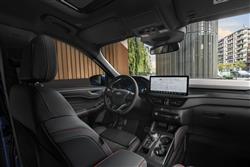Ford Kuga PHEV - ABC Leasing
PLUGGING THE GAP(some text hidden)
By Jonathan Crouch
Ten Second Review word count: 77
It seems you can't have a cutting-edge mid-sized SUV of any kind these days without having a plug-in hybrid version, so Ford continues to offers that tech with this improved version of its third generation Kuga crossover. EV driving range and tax-beating overall CO2 efficiency have been considerably improved with this updated model, which also gets a sharper look and a rejuvenated cabin. Plus it's much faster and can tow heavier loads. Worth a second look then.
Background word count: 145
Perhaps being a market leader is about following established trends rather than pioneering new ones. Ford certainly seems to work that way. The Blue Oval brand didn't really establish any sort of real presence in the SUV sector until the second generation version of its mid-sized Kuga crossover model was facelifted in 2016. And it took the company until the 21st century's third decade to launch its first volume made EV (the Mustang Mach-E) and its first plug-in car, the Kuga PHEV model which is our focus here. This is the third generation Kuga, moved subtly up-market to make space for the Puma crossover which slots in below this model. In early 2024, Ford updated this MK3 Kuga with a smarter look, a redesigned cabin and a bit more sophistication. And gave this PHEV version more power, greater towing ability and a longer EV range.
Driving Experience word count: 317
As you'd expect, this PHEV variant is petrol-powered. Ford didn't have a Euro-market green pump-fuelled engine that was suitable for plug-in tech, so has borrowed for this installation a 2.5-litre unit that it uses with the US market 'Escape'-branded version of this car. As before, there's a CVT automatic gearbox but for this revised model, the engine is now paired with a more powerful electric motor (taking total power to 243PS) and a revised 14.4kWh battery that now allows for a much longer EV driving range (almost 43 miles). A 30-35 mile range expectation is probably more realistic. Ford's improved towing capacity to 2,100kgs. You'll need to get your head around all the drive modes. As well as the usual 'Normal', 'Eco' and 'Sport' settings, there's also a 'Slippery Deep Snow/Sand' mode - which is curious because this Kuga PHEV can only be had with front wheel drive. It can now though, be had in a more SUV-orientated 'Active' trim, which has a ride height raised by 10mm at the front and 5mm at the rear. Back to drive modes; there are also four further settings for the electric drivetrain: 'EV Now' focuses the drivetrain on all-electric output; 'EV Charge' (rather inefficiently) tops up the battery using the engine; and 'EV Later' holds the current state of charge so that you can save it for urban driving you might want to do later in your trip. Most of the time though, you'll simply leave the car in 'EV Auto', where clever electronics determine the most efficient use of engine and battery power. You can boost brake regeneration (and therefore energy harvesting) by clicking on an 'L' button on the gear selector. And in theory, it's possible to drive at up to 85mph on battery power alone. With the full powertrain working, 62mph from rest now takes 7.3s (almost 2 seconds faster than before) en route to 124mph.
Pictures (High res disabled)

.jpg)
.jpg)
.jpg)
.jpg)
.jpg)

Scoring
Category: Compact Car
| Performance | |
| Handling | |
| Comfort | |
| Space | |
| Styling | |
| Build | |
| Value | |
| Equipment | |
| Economy | 80% |
| Depreciation | 60% |
| Insurance | 60% |
| Total | 67% |